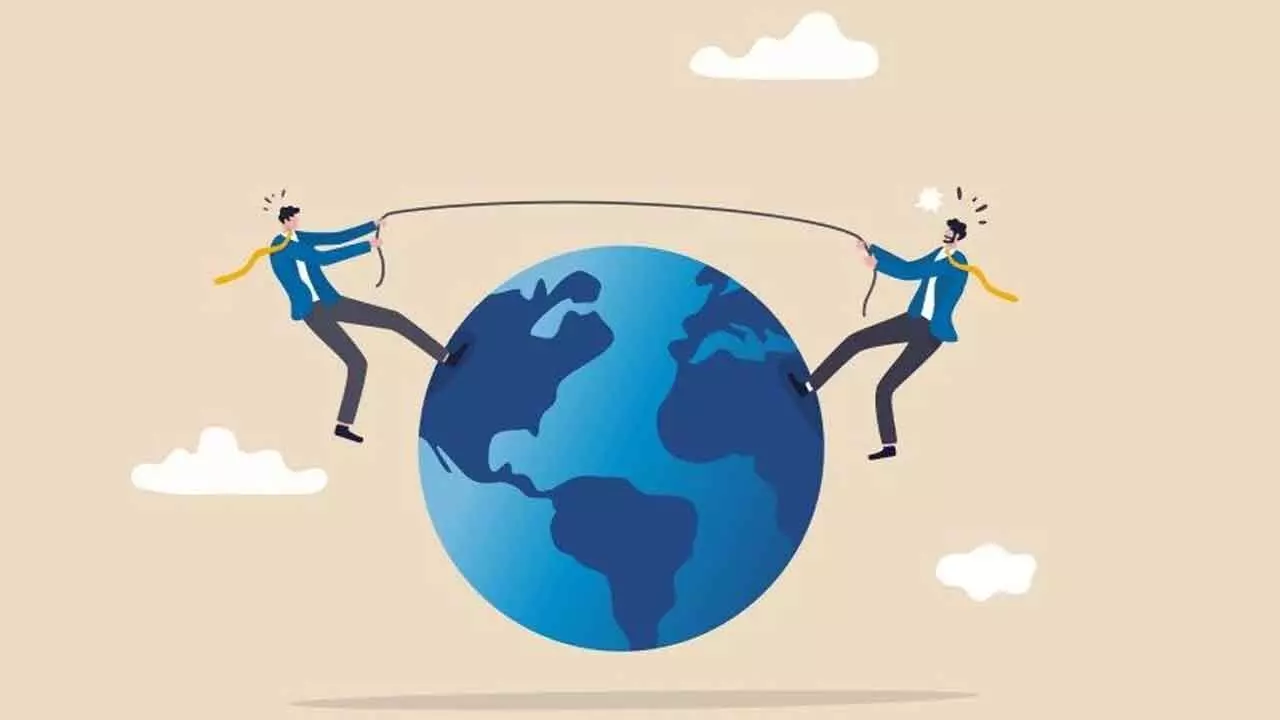Global Cooperation And Support Needed To Conquer Challenges
Rising temperatures, extreme weather events and rise in sea levels pose a significant threat to the ecosystem and human populations. Ongoing conflicts and humanitarian crises are causing displacement, suffering and instability
Global Cooperation And Support Needed To Conquer Challenges

The world has been facing a slew of challenges due to geopolitical tensions, trade policy uncertainty after the Trump administration announced reciprocal discounted higher tariffs, the supply chain getting disturbed due to various sanctions, border tensions and need to spend more on defence because of the Russia and Ukraine conflict, Israel-Palestine and Hamas conflict. As a result of these worries many countries are caught in heavy public debt. This is especially regarding nations without having fiscal buffers and those whose revenue is getting consumed by interest burden. This is one of the reasons why the world is suffering from low economic growth, particularly due to less focus on adoption and mitigation measures on climate change that has led to droughts, cloud bursting, floods, thunderstorms and warmer climates. These setbacks are resulting in heavy damage and losses, while rebuilding is a tough option given the lack of substantial aid, grants or debt from developed countries, who, in the first place, are responsible for current climate events due to excess use of fossil fuels and green gas emissions. This is despite the Paris agreement to bring down temperature below 1.5°c from the pre-industrial level. These must be addressed by way of adequate adoption and mitigation measures.
We are already experiencing extreme heat levels and high warming, which are affecting agriculture, leading to loss of life and adverse impact on environment.
It is very deplorable that today’s biggest global challenges are climate change, conflict and humanitarian crises. There is an urgent need for greater global cooperation to address interconnected issues like poverty, inequality and food security. Rising temperatures, extreme weather events and rise in sea levels pose a significant threat to the ecosystem and human populations. Ongoing conflicts and humanitarian crises are causing displacement, suffering and instability. The issues of poverty, hunger, malnutrition, global health crisis, biodiversity loss disrupting ecosystem require greater global cooperation and support to lessen the impact.
There was an understanding that every country should endeavour to achieve 17 the Sustainable Developmental Goals (SDGs) related to removal of hunger good health and well-being, quality education, gender equality, providing clean drinking water, and sanitation, affordable and clean energy, decent work and economic growth, industry, innovation and infrastructure, reduced inequalities, sustainable cities and communities, responsible consumption and production, climate action including environmental protection with adoption and mitigation measures , life below water and on land, peace, justice and strong institutions and partnership are the goals that are to be achieved by 2030.
Following outbreak of Covid-19, achieving the desired goals is behind schedule and in the current situation of low economic growth, lesser focus on climate change measures, high fiscal deficit and high domestic and external debt, lesser fiscal buffers, ongoing wars and tensions are adding to the problems in scaling the 2030 target.
The 2024 Sustainable Development Goals report highlighted that nearly half of the 17 targets are showing minimal or moderate progress, while over a third are stalled or going in the reverse.
According to UN Secretary General Antonio Guterres “As per the annual SDG report card 2024, the world is getting a failing grade. The takeaway is simple - our failure to secure peace, to confront climate change and to boost international finance is undermining development. We must accelerate action towards going about Sustainable Developmental Goals and we don't have a moment to lose.”
Things are getting worse as the geopolitical tensions remain and there are no signs of any impending peace. Moreover, the recent trade and policy uncertainty of Trump administration is also taking a toll on international trade and economic growth.
Globalization and international trade and commerce, international collaboration and cooperation had the desired outcome in terms of growth of cross border trade, movement of capital, technology, higher growth and global prosperity. There is a fear that globalisation is making way for regionalisation in the current policy of focusing on individual regional development or national self-sufficiency. There is also a fear that the geopolitical tensions and trade wars and policy uncertainty, including restricted emigration, are pushing the world economy into rival blocks. The fear of fragmentation of the world economy even though not much evident should be totally avoided and global cooperation and collaboration need to be continued.
The next COP 30 is being held under the Presidency of Brazil in November. Prior to that climate meetings are scheduled for June 16 to 26 in Bonn. Brazil has sets a three-point agenda for COP 30: 1. To reinforce multilaterism and climate change regime under UNFCCC; 2. To connect the climate regime to people’s lives and 3. To accelerate implementation of the Paris Agreement by stimulating action and structural adjustments across all institutions that can contribute to it.
It is being watched about how much these efforts are yielding the desired outcome amid global uncertainties.
Global leaders must come forward to overcome these challenges and take required measures to reduce the tension and war, conflict and focus on global economic growth and development with equal emphasis on climate change measures. This collective can help bring about prosperity and sustainability for the world as a whole.
(The author is former Chairman & Managing Director of Indian Overseas Bank)

